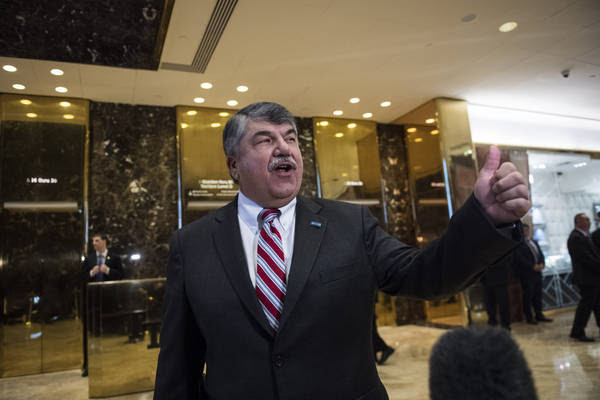|

AFL-CIO President Richard Trumka (Photo by Jabin Botsford/The Washington Post)
The Green New Deal just got another opponent — and no, it’s not another Republican.
The national arm for labor unions is objecting to the ambitious new plan to combat climate change and could present a thorny problem for Democrats.
As my colleagues Colby Itkowitz, Dino Grandoni, and Jeff Stein report, “support for the Green New Deal has become a benchmark for Democrats running for president. But the AFL-CIO throwing water on the plan complicates matters for Democrats who rely on labor support.
“Without the backing from unions or the business community, it will be a hard sell for Democrats to get it beyond grass-roots support.”
In a letter to the Green New Deal’s authors Sen. Edward J. Markey (D-Mass.) and Rep. Alexandria Ocasio-Cortez (D-N.Y.), the group warned that the resolution could harm U.S. workers and “is not achievable or realistic.”
Members of the AFL-CIO’s Energy Committee — Cecil Roberts, president of the United Mine Workers of America, and Lonnie Stephenson, president of the International Brotherhood of Electrical Workers — said they could not support a proposal that did not address their concerns.
“We will not stand by and allow threats to our members’ jobs and their families’ standard of living go unanswered,” they wrote, according to my colleagues.
“Their opposition highlights the new political fault lines forming over the controversial proposal that, as my colleagues note, “marries climate change and income inequality as one all-encompassing issue.”
As my colleagues note, the plan “calls for the federal government to achieve net-zero greenhouse gas emissions with a ‘fair and just transition’ for all communities and workers, including by creating millions of high-wage jobs, health care and housing for all, a sustainable environment and enormous infrastructure investments.”
And “there has long been tension between the environmental and labor movements, two major parts of the broader Democratic coalition, over worries that rules meant to curb pollution can lead to job losses in regulated industries with high-quality, good-paying positions.”



